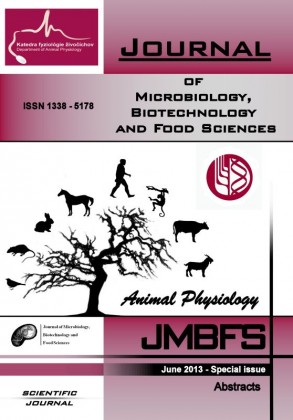ACTIVE CASPASE-3 DETECTION IN CARBAMATE BENDIOCARB TREATED RABBIT LIVER
Keywords:
bendiocarb, caspase-3 activity, liver, rabbit, toxicityAbstract
Increasing use of pesticides all over the world makes it necessary to reveal the toxic risk in populations of non-targeted organisms. Bendiocarb is a carbamate pesticide which is used against a variety of insects, and the liver has an important role in its process of detoxication and excretion. In our experiment were used 56 adult rabbits which were divided into four groups (control, days 10, 20, 30 of administration) and all experimental rabbits received bendiocarb per os in a dose 5 mg/kg b.w. Almost no caspase positive cells were detected in the untreated samples. After 10 days of bendiocarb treatment, numerous immunoreactive cells were present throughout the organ, most commonly around the portal tract (PT). Positive cells were still abundant at 20 days close to the central vein, with a decline at 30 days, at which point vacuoles were observed in some cells together with replacement fibrosis. We concluded that bendiocarb has moderate effect on increase of programmed cell death, particularly after short-term administration.Downloads
Download data is not yet available.
Downloads
Published
2013-06-06
How to Cite
Petrovová, E., Maženský, D., Luptáková, L., & Šťavová, Ľubica. (2013). ACTIVE CASPASE-3 DETECTION IN CARBAMATE BENDIOCARB TREATED RABBIT LIVER. Journal of Microbiology, Biotechnology and Food Sciences, 2(Abstracts special issue), 7. Retrieved from https://office2.jmbfs.org/index.php/JMBFS/article/view/7523
Issue
Section
Biotechnology
License
Copyright (c) 2013 Eva Petrovová, Dávid Maženský, Lenka Luptáková, Ľubica Šťavová

This work is licensed under a Creative Commons Attribution 4.0 International License.
All papers published in the Journal of Microbiology, Biotechnology and Food Sciences are published under a CC-BY licence (CC-BY 4.0). Published materials can be shared (copy and redistribute the material in any medium or format) and adapted (remix, transform, and build upon the material for any purpose, even commercially) with specifying the author(s).

